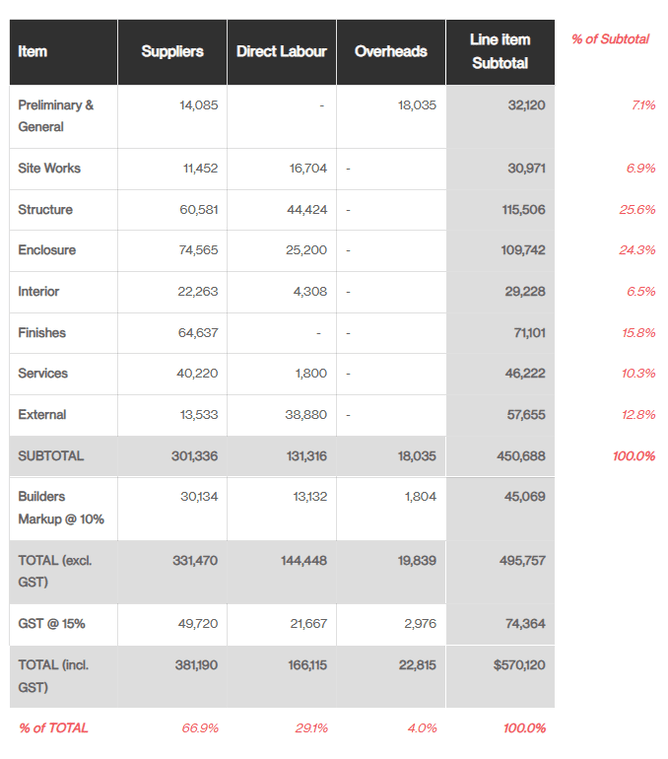Disagreements over unforeseen costs are a common source of conflict between residential builders and their clients. These conflicts can ruin the building experience and lead to payment disputes, causing stress for everyone involved.
The seeds of this discontent are often planted early in the client–builder relationship.
I wrote an article last year titled “Seven things I wish I knew before I started my Grand Design” which outlines an approach to architectural home building designed to avoid this type of conflict. I recommend that clients select their builder as early as possible in the design and build process and work with them over time to develop a mutual and deep understanding of building costs and the client’s spending priorities.
Regardless of this advice, there are still many clients who believe they’ll get a better price by waiting until their design is complete and inviting several builders to compete for their job. And in the current market, most of their invitations will be accepted.
Bespoke architectural homes are most definitely not a “commodity”, and there are many factors that can interfere with the best prices being obtained.
Competitive tenders can be a great way to find a builder who needs the work the most - and may even be willing to “lowball” their quote to win a job and hope they can claw back a profit during the project.
In other words, they’re willing to plant the seeds of discontent very early in the client–builder relationship.
Planning your build and managing cost
Compare me well
Theodore Roosevelt once said that “comparison is the thief of joy”, and no builder enjoys being part of a bidding war. Personally, I’d much rather you choose a Registered Master Builder that has been in business for over 40 years, has won multiple House of the Year Awards, is dedicated to training apprentices, and where the owners’ names rhyme with “Boss” 😉
Regardless of my personal preferences, there are some architectural homes we really want to build - however the client decides to choose their builder. So, I would just add to Teddy Roosevelt’s quote and make this humble request:
"If you choose to compare me (on price, with another builder) then please make sure you compare me well."
Slice and dice your quotes
This is not just a technique to use in your new kitchen. “Slice and dice” is also used in data analysis to reduce a body of data into smaller parts to improve decision-making.
Slicing and dicing your competing bids will help you choose a builder with the best and most comprehensive quote, not just the cheapest.
The Coordinated Building Information (CBI) system by CIL Masterspec is the most obvious way to compare building quotes in New Zealand. At the highest level, CBI specifies 8 classes of work:
Preliminary & General Costs (site setup, admin, permits)
Site Works (demolition, earthworks, foundations)
Structure (slabs, steel, framing, masonry)
Enclosure (roofing, cladding, joinery)
Interior (walls, ceilings, internal doors)
Finishes (painting, flooring, tiling)
Services (plumbing, electrical, HVAC)
External (driveways, paths, fencing, landscaping)
These are used in tender documentation by both NZIA and NZS 3910, so most professional builders should be capable of slicing quotes this way.
To reveal even more, I also suggest dicing your building quotes by cost type:
Supplier Costs – materials, subcontractors
Direct Labour – work by the builder’s employed staff
Overhead Costs – costs to run the builder’s business
You should also ask for:
The markup they’ve applied (this may vary by section)
The charge-out rates for their labour
And always clarify whether prices are inclusive or exclusive of GST.
Before and after
By comparing your builder quotes this way, you’ll move from a vague total like:
$570,120 including GST
To a breakdown that looks like:
Deeper analysis
This approach helps you compare builders well, and ask better questions:
Are there gaps in the quotes?
Why are some categories missing labour or supplier costs?
Are there major differences in markup or labour rates?
How will the overheads benefit your project?
Some builders may outsource labour (lower overheads). Others may offer offsite project support (higher overheads). The key is understanding why quotes differ.
Seeds of Content
The most valuable outcome of this approach isn’t just cost comparison. It’s the quality of the conversations you’ll have with your preferred builder.
You may never know if you got “the best deal”, but by asking the right questions and comparing well, you’ll have confidence in your choice.
If you'd like a copy of my Quote Comparison Template, get in touch with me here.





